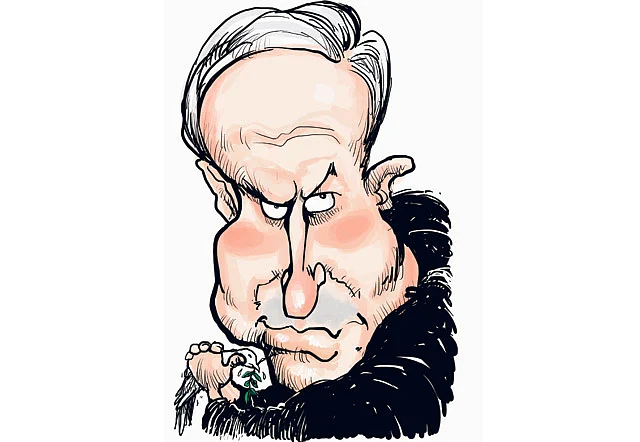Tired of the jokes about his wife, perhaps, Northern Ireland's first minister, Peter Robinson, last week cracked a gag of his own. Marking an end to more than 100 hours of talks, he said that the province would be lobbying for the inclusion of negotiating as an Olympic sport in time for the London games of 2012 and that Northern Ireland would win the gold medal.
Not so fast. There could be stiff competition, at least in the endurance event. One hundred hours might seem like a marathon to Robinson, as must the long Good Friday process that preceded it. But for Palestinians and Israelis, that's little more than a warm-up. They have been involved in peace talks, one way or the other, since the Oslo Accords of 1993. And while the people of Northern Ireland have a prize to show for all that effort namely, peace the negotiators of the Middle East are still, 17 years on, empty-handed. If Robinson and Martin McGuinness have earned their gold, the Israelis and Palestinians surely deserve a medal for fruitless stamina.
And now they are poised to submit themselves to another round, with February 20 pencilled in the diary. This time, just as beach volleyball made its debut at the Atlanta Olympics, the organisers are introducing a new format. The two sides will not sit across a table, but rather in two separate rooms. The referee the role taken by that hero of Good Friday 1998, the former US senator and now Middle East envoy, George Mitchell will shuttle between the two. If the Israelis say "no", Mitchell will knock on the Palestinian door and say that they said "maybe". If the Palestinians say that the Israelis can go to hell, the perennially patient Mitchell will relay the message as: "They've asked for more detail." Think of a couple who refuse to speak to each other, communicating instead through their children. "Tell her, I need to use the car tonight." You might call it infantile. In international diplomacy, they call it proximity talks.
After 17 years of disappointment, it makes sense to approach this latest effort with our expectations somewhere below the sub-basement. It's not certain the talks will begin at all: Palestinian National Authority President Mahmoud Abbas is currently consulting Arab and other foreign leaders on whether he should drop his insistence that there should be no talks until Israel agrees to freeze all colony-building in the Occupied West Bank. The message he's getting is that he should accept Israel's partial and temporary moratorium on building, and talk.
Going through the motions?
At the heart of Abbas' dilemma is a judgment on his Israeli counterpart. Is Benjamin Netanyahu serious about peace, or is he doing the bare minimum to keep Washington off his back? One nugget of conventional wisdom holds that while the Palestinians want a deal but not negotiations, the Israelis want negotiations but not a deal. In this view, Netanyahu is happy to go through the motions of talks so that he can boast to world opinion that he is doing the right thing just so long as he doesn't have to do anything difficult. That way he can preserve his rightwing coalition, which would surely unravel at the first whiff of compromise.
Others say that Bibi is sincere, even impatient for an agreement. Which view is right? Even those who work for the Israeli prime minister are not sure. One official says he does not yet know if his boss is Yitzhak Shamir the former Likud PM and human roadblock who made a career out of saying no or Ariel Sharon, the Likud leader who eventually seemed determined to resolve the conflict until he was fatefully struck down by a stroke.
But surely the fact that late last year Israel announced further building in Occupied East Jerusalem undermines any claim that Netanyahu is serious about peace? Not so, say his defenders. It merely showed that Bibi is now drawing a distinction between those lands he intends to keep and those he is ready to give up, an implicit end to the dream of Greater Israel, in which Israel would keep the lot.
The PM's allies say that in person he is a different man from the brash, wheeler-dealer of his first, 1990s term. The trouble is, as even his advocates confess, there is only the slimmest evidence for it: lots of warm words, very few concrete deeds. Which leaves the Palestinians with a choice. They can heed Mitchell when he says "trust me" and turn up at the proximity talks, waiting to hear what Bibi comes up with. Or, better, they can take Netanyahu at his word when he says "test me" and do more than wait. They should devise a strategy that will push the Israeli prime minister, forcing him to make good on all the talk. It will mean taking him by surprise with a move that requires a serious response. But do it: call his bluff.
One Palestinian insider says they are about to enter "a grey zone", full of uncertainty. But the alternative is no talks at all. And, even after 17 years of frustration, that would be a disaster.
Sign up for the Daily Briefing
Get the latest news and updates straight to your inbox
Network Links
GN StoreDownload our app
© Al Nisr Publishing LLC 2026. All rights reserved.
